Postdoc - Biological Physics
Rice Unviersity - 2015
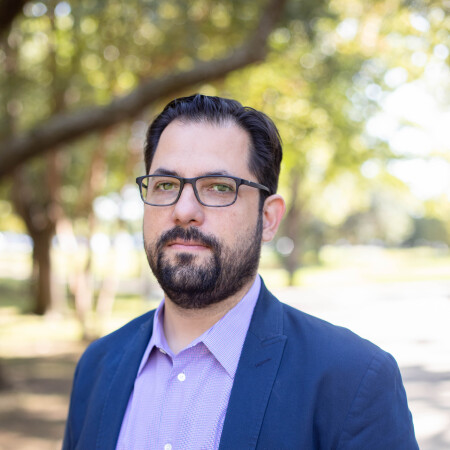
Professional Preparation
Postdoc - Biological Physics
University of California San Diego - 2012
University of California San Diego - 2012
Ph.D. - Computational Biology
University of Notre Dame - 2010
University of Notre Dame - 2010
M.S. - Applied Mathematics
University of Notre Dame - 2010
University of Notre Dame - 2010
M.S. - Electrical Engineering
Technische Universitat Munchen - 2004
Technische Universitat Munchen - 2004
B.S. - Electrical Engineering
Tec de Monterrey (ITESM) - 2001
Tec de Monterrey (ITESM) - 2001
Research Areas
Biomolecular Structure & Function
Methods: Statistical Inference, Information Theory & Simulation
Molecular Evolution
Biomolecular Interactions & Networks
Publications
Genotypic and phenotypic factors influencing drug response in Mexican patients with type 2 Diabetes Mellitus 2018 - Journal Article
Characterization of C-ring component assembly in flagellar motors from amino acid coevolution 2018 - Journal Article
Global pairwise RNA interaction landscapes reveal core features of protein recognition 2018 - Journal Article
Revealing protein networks and gene-drug connectivity in cancer from direct information 2017 - Journal Article
Sequence co-evolutionary information is a natural partner to minimally-frustrated models of biomolecular dynamics 2016 - Journal Article
A combined computational and genetic approach uncovers network interactions of the cyanobacterial circadian clock 2016 - Journal Article
Awards
Mexican Researchers System (SNI) Level II - CONACYT [2018]
Research Excellence Award - Department of Computer Science and Engineering, U. of Notre Dame [2010]
Kaneb Center Outstanding Graduate Teaching Award - University of Notre Dame [2008]
Kellogg Fellowship for Graduate Studies - University of Notre Dame [2005]
Werner von Siemens Excellence Award - Siemens [2002]
Appointments
Assistant Professor
Department of Biological Sciences [2015–Present]
Department of Biological Sciences [2015–Present]
Assistant Professor (Affiliate)
Department of Bioengineering [2016–Present]
Department of Bioengineering [2016–Present]
Member
Center for Systems Biology, University of Texas at Dallas [2015–Present]
Center for Systems Biology, University of Texas at Dallas [2015–Present]
News Articles
Researchers at UNT and UTD discover way to more readily and accurately design new proteins to reprogram living cells
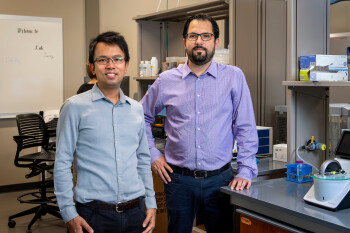 Proteins can be altered by removing part of a protein from one cell and replacing it with a similar part from another protein. However, the joined protein modules are not always compatible and must be engineered through trial and error to produce a successful new protein that can alter the function of a cell. This process is time consuming, and researchers are limited by the availability of compatible biological components.
Proteins can be altered by removing part of a protein from one cell and replacing it with a similar part from another protein. However, the joined protein modules are not always compatible and must be engineered through trial and error to produce a successful new protein that can alter the function of a cell. This process is time consuming, and researchers are limited by the availability of compatible biological components.But that process is being revolutionized by Clement Chan, assistant professor in the Department of Biomedical Engineering and member of UNT’s BioDiscovery Institute, and Faruck Morcos, associate professor in the Department of Biological Sciences and member of UTD’s Center for Systems Biology, who have created a coevolutionary modeling approach that engineers mutations in combined proteins to ensure their compatibility and eliminate costly, time-consuming trial and error.
Molecules Are Everywhere. Now, You Can ‘Catch’ And Explore Them With A New Game
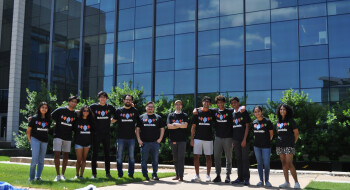 University of Texas at Dallas Professor Faruck Morcos has been leading a team in creating a project aimed at getting people excited about exploring the molecular world. “We decided to start a project to disseminate science to general audiences and interact with high school students,” Morcos said. So, they created a game app: MoleculeGo.In the game, each player is a scientist who goes out into the real world to discover molecules to take back to the app’s laboratory.
University of Texas at Dallas Professor Faruck Morcos has been leading a team in creating a project aimed at getting people excited about exploring the molecular world. “We decided to start a project to disseminate science to general audiences and interact with high school students,” Morcos said. So, they created a game app: MoleculeGo.In the game, each player is a scientist who goes out into the real world to discover molecules to take back to the app’s laboratory.More information about the app can be found at MoleculeGo.com
Scientists' Computational Models Predict Mutations' Effect on Proteins
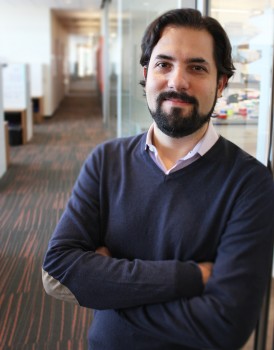 According to new research, the key to a successful, long-term relationship is for each partner to adapt to the other’s changes over time.
According to new research, the key to a successful, long-term relationship is for each partner to adapt to the other’s changes over time.At least, that’s what appears to be true for pairs of proteins in bacteria.
A University of Texas at Dallas scientist and his colleagues are developing computer models to predict how mutations — or tiny physical changes — affect the biological performance of pairs of proteins that have co-evolved to work together.
A Scientific Dating Game: Biologists Play RNA-Protein Matchmakers
Virtually all functions in our bodies require precise interactions between radically different types of molecules. The vast majority of the time, these encounters yield nothing, but a special few sustain life as we know it. Drs. Faruck Morcos and Zachary Campbell at The University of Texas at Dallas are pursuing what differentiates a fruitful encounter from a dud — a mystery with long odds similar to finding a soul mate among the metaphorical millions of fish in the sea. Their ultimate goal is to prevent the relationships that become toxic and result in disease.
Biologists Design a Plug-and-Play Controller for Gene Expression
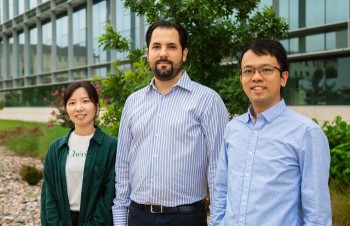 Researchers from two University of Texas System institutions have engineered biological components that can rewire genetic response pathways, creating a template for designing new cellular behaviors with wide-ranging potential applications.
Researchers from two University of Texas System institutions have engineered biological components that can rewire genetic response pathways, creating a template for designing new cellular behaviors with wide-ranging potential applications.Dr. Faruck Morcos of The University of Texas at Dallas and Dr. Clement Chan of UT Tyler have collaborated on modular versions of repressors — the proteins that block genetic instructions.
In a paper recently published in Nucleic Acids Research, they proposed a new strategy to create living cells that can sense multiple signals via reporter proteins. Their work, which has potential applications in medical diagnostics, originates from an interdisciplinary field called synthetic biology.